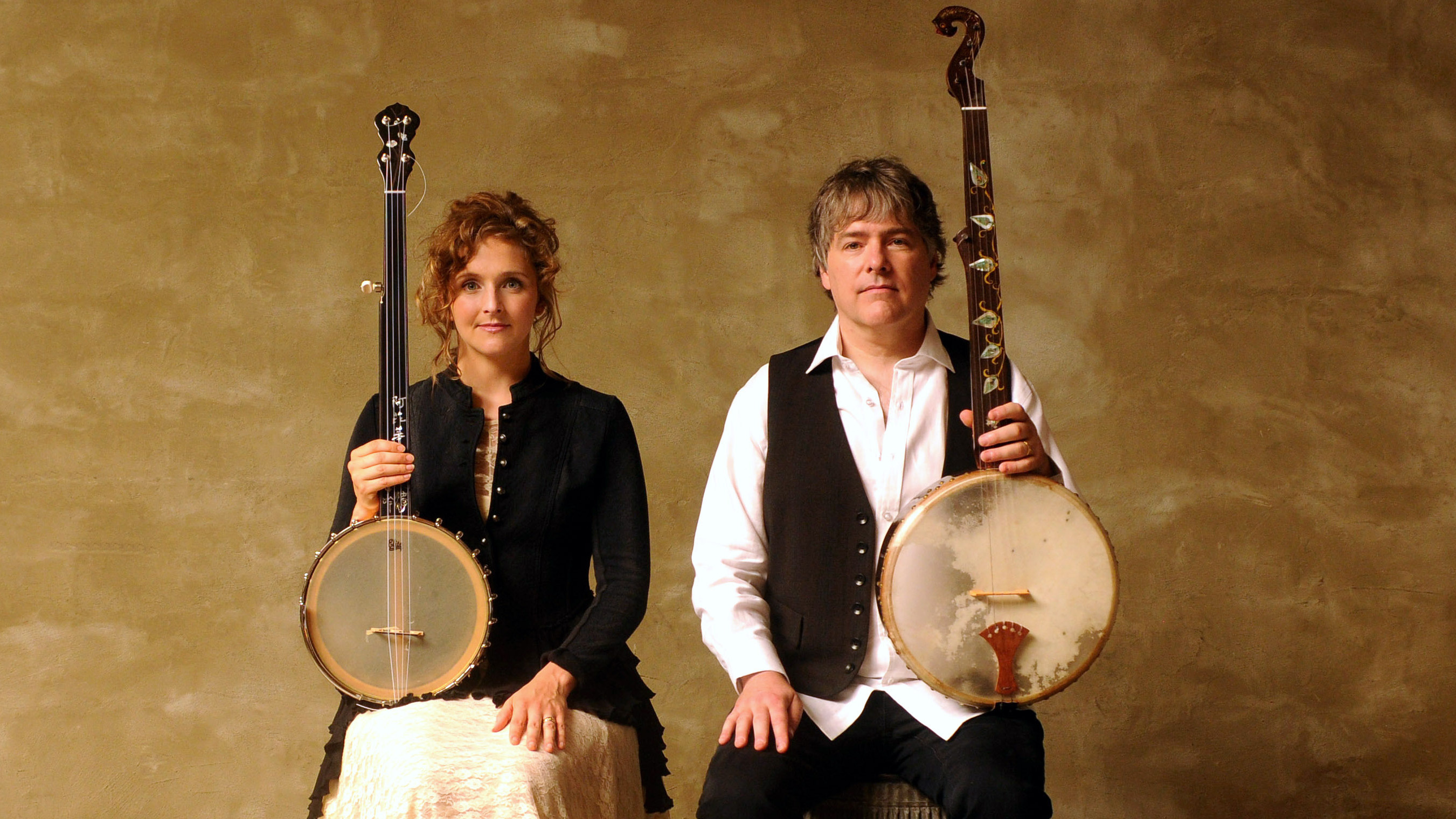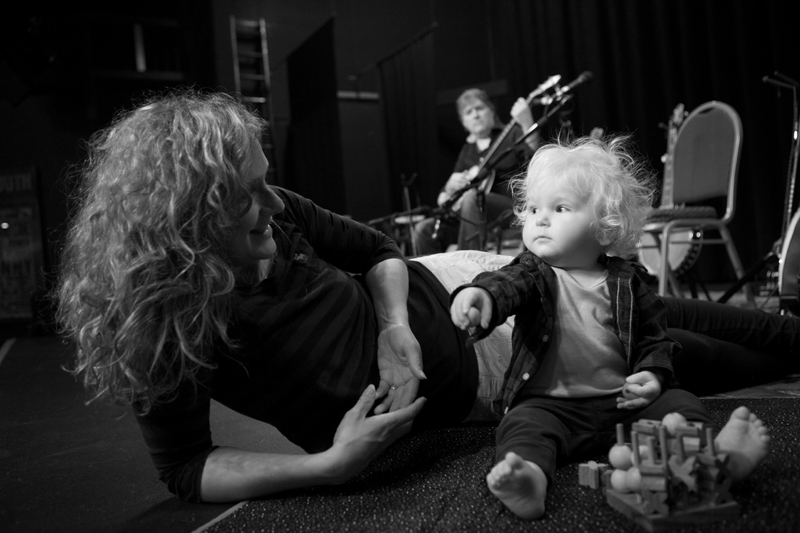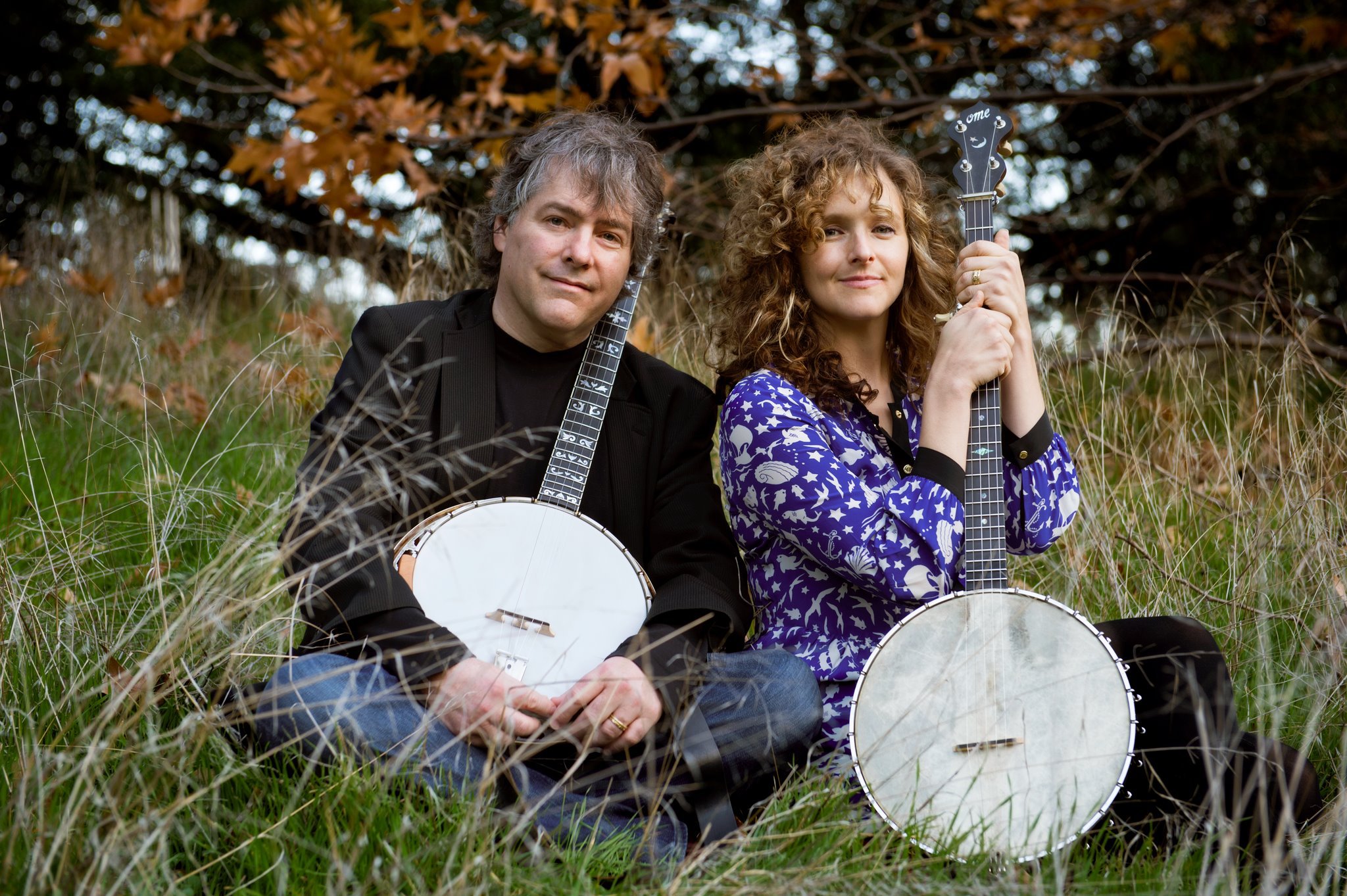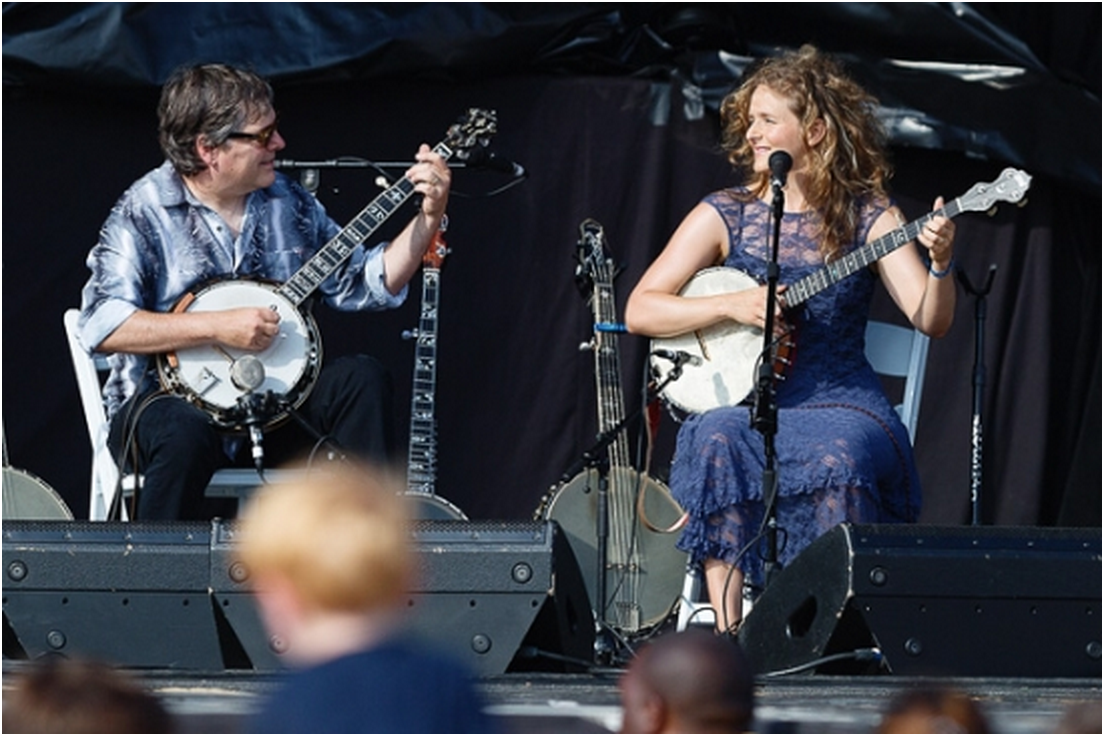Béla Fleck & Abigail Washburn: Family Practice

There’s a familiar old saying that suggests that the family that plays together stays together. Yet, when the playing involves the family’s livelihood, that proposition can get a little tricky. Throw a newborn baby into the mix and, suffice it to say, there’s a fair amount of balance and careful consideration that factors into the equation.
That’s what makes the current collaboration of husband-and-wife banjo duo Béla Fleck and Abigail Washburn all the more impressive—if for no other reason than they’ve managed to successfully integrate the personal, practical and professional aspects of their lives with such clear finesse. With a new album (appropriately and economically titled Béla Fleck & Abigail Washburn), a busy touring schedule and a 22-month-old toddler in tow, it’s somewhat astounding that they’ve managed to give each priority the importance it deserves.
Indeed, in many ways, the timing might seem out of sync. However, the couple insists their strategy was planned like this all along.
“We always knew we wanted to record a duo album and tour together,” Washburn explains. “However, I didn’t feel like I had quite earned my way there yet, at least not back when we were first together. I felt like I needed to learn more and to build up my own career before I could tour with Béla Fleck. I know it might sound silly now since we had been together for a while before we did the album. But a lot of things have to line up for a music career to work out and for people to actually want to see you practice your art. And so I toured for about 10 years, both solo and with the band Uncle Earl, and I finally felt like I had enough notoriety that if promoters wanted to book us, people would know who I was.”
Washburn had reason for caution. Her husband, a 15-time Grammy Award winner, is widely considered one of the most innovative banjo players of all time, having expanded the instrument’s boundaries from bluegrass to jazz to classical recordings and concertos. After an apprenticeship playing on the streets of Boston, mandolin player Sam Bush recruited him to join New Grass Revival, a supergroup of sorts that left an indelible influence on nearly every up-and-coming bluegrass band that followed.
However, it was his extended stint with the experimental outfit Béla Fleck & The Flecktones that established him as an instrumental innovator. The band’s bold and progressive style defied description and set new standards when it came to defining a progressive posture. Although the Flecktones went on hiatus in 2012, Fleck has continued to nurture his experimental tendencies, pairing his banjo with musical greats Chick Corea, Edgar Meyer, Jean-Luc Ponty and Stanley Clarke, as well as a number of local symphonies drawn to the idea of crossover collaborations.
Given that résumé, it is little wonder why Fleck was cautious, too. “We didn’t want people to think it was simply Béla out touring with his girlfriend,” he says. “But it eventually worked out, and now that we’re finally touring together, the duo is drawing as well as most other things that I do with people a lot more established than Abby. She has certainly gotten her name out there and gotten credit for a lot of great things she’s done on her own.”
That is something of an understatement. Washburn has not only established herself as a leading exponent of clawhammer banjo, but also as a scholar and knowing world traveler. After graduating from college with a major in East Asian studies, she spent five years in China before moving to Nashville, Tenn., and joining the progressive bluegrass band Uncle Earl, whose 2007 album Waterloo, Tennessee was produced by Led Zeppelin bassist John Paul Jones. Her second place win in a songwriting competition at MerleFest earned her a recording contract and led to her first solo record, Song of the Traveling Daughter, which paired her with Fleck as her producer following their meeting at a Nashville square dance. Her next project, The Sparrow Quartet, also included Fleck, but this time as one of the principals.

At the behest of the U.S. State Department, they became the first American band to tour Tibet and later performed at the 2008 Olympics in Beijing. The group’s eponymous debut album, Abigail Washburn & The Sparrow Quartet, once again brought Fleck behind the boards. Washburn’s subsequent solo album led to another tour of the Far East and a series of collaborations with Chinese musicians, culminating in a New York theater production, Post-American Girl, a work that merged Asian and Appalachian folk art. In addition, she participated in an experimental outfit dubbed The Wu-Force.
In the end, it was the arrival of the couple’s son, Juno, in 2013 that finally convinced the pair that they should work together as a musical duo, an arrangement that they had previously attempted only at family gatherings.
“When we realized we were going to have a baby, we also realized that we didn’t want to be apart anymore,” Fleck says. “I think Abby would have waited a lot longer to tour with me, but I reached a point where I just wanted to do it. She didn’t want people to feel like she was getting a free ride, but yet, when we knew a kid was coming, we decided we didn’t want to spend our time apart. Many of our friends, especially the dads, feel the pressure to go out and make money while the mom stays home. But that can also cause resentment and then it becomes an even tougher proposition. We made the decision to commit the next few years—at least—and hopefully, a significant portion of the rest of our lives to playing together so we can be together as a family.”
Photo: Amanda Kowalski

While they both admit the prospect was daunting at times, they also maintain that it was the best decision they could have made. “It was a far better option than me going out and touring on my own to make money for the family,” says Fleck.
“And it was far better than me being left at home with Juno and us being separated,” Washburn agrees.
Still, merging the personal and professional can take its toll, and now that the two are working in tandem, they’ve become well aware of the potential difficulties that it can entail. “A lot of families can’t work together due to the personalities of the people involved,” Fleck suggests. “I’m pretty intense and Abby is pretty chill— not that she doesn’t have her intensity, but as people, I think I’m a little more dogmatic. I can’t stop working. Abby is more balanced and wise, and so the combination works well. I enjoy working really hard, and if I’m not doing that, I feel like I’m slacking off or something. Abby has a more relaxed approach to things, and that’s healthy for me to be around.”
“I work hard as well,” Washburn adds, obviously intent on setting the record straight. “From what Béla said, it may make it seem like I’m kind of lazy. It’s just that I have balance. I can go, ‘OK, I can work hard at it now, but then not work hard at it later.’ I have a big picture about things. Béla has a big picture about things, but he just works his ass off. I can’t believe the amount of stuff he’s able to get done. It’s pretty mind-boggling.”
That synergy also came into play with the making of the new album. Both musicians took on a specific role that fit their individual intents. Washburn says that she tended to etch out the melodies and then sing the songs as her instincts dictated. She credits Béla with the ability to elaborate on the arrangements and take the material into unexpected realms. “We each have our own roles that we each respect in one another,” she offers. “We’re not in each other’s shit, if you know what I mean.”
“A lot of times, Abby’s got the start of a song idea that comes with a banjo part, so that gravitates toward what I’m going to do,” Fleck says. “Of course, I’m not going to play what she’s going to play. Looking at what’s there and trying to figure out a way to add something to it—something that feels inevitable and like it’s supposed to be there—that’s the challenge. But it’s the same thing I do in any musical situation I’m in and I’m sure Abby does the same.”
Despite their varied backgrounds, both admit that the project forced them out of their comfort zones and found them imagining what an album built solely around two banjos could—and should—sound like. A cursory listen finds an apparent Appalachian influence within a template that boasts a decidedly folk finesse, as evidenced by the wealth of homespun melodies that populate the record. However, Fleck insists there’s far more to the music than that.

“That’s a very interesting thing about this record,” he notes. “Yes, it does present itself like it’s a traditional album and yet, what traditional albums can you name that feature clawhammer banjo and three-finger banjo playing together and only that as far as an arrangement? There aren’t any! So the truth is, we were trying to take an approach that maybe sounded ancient, but for which we had to create the architecture for ourselves. It had to have what you want in any music. You want to cover all the parts and all the bases. You want a groove. You want to have development in each piece. You want every verse to have its own character and the chorus to have its own character. You want good instrumental play and you definitely want the best vocals you can possibly get with the right emotional feel. Pretty soon, you know what to do to give each song those elements. That takes a lot of work and a lot of thought, but we know how to do it. We’ve done it in groups, but now, the difference is we don’t have someone to play the bass line, so I’m going to play the bass line or Abby is going to play the bass line on a lower-tuned banjo.”
Given that Fleck and Washburn were the only two players on the album, they opted to use a variety of banjos—seven in all—to create the necessary tones and textures that might otherwise have been missing due to the lack of larger instrumental tableau. Typically, the two would envision an idea and explore it before heading into their basement recording studio. There they spent several hours rehearsing each song before finally committing it to tape. With only two players in the mix, the duo was determined to create a varied template that didn’t simply sound like two banjos playing in sync.
“I always loved it when we played as a duo because there was something about it that seemed so warm and magical,” Fleck recalls. “But having two banjos in the same register for an entire evening was a bit trying. So I had an instrument built for me that went below Abby’s banjo—a whole pitch below–making it a baritone banjo. Abby was already playing her cello banjo, which changed things up a little bit, and then we added a ukelele banjo, which was a register above our regular banjos. So, all of a sudden, we had something to work with to give the song its own character and its own set of rules. We were trying to build this template of what a double banjo and vocal album would sound like. I can’t say there weren’t times when we didn’t disagree, but there wasn’t any contentious disagreement because we don’t do things like that.”
For Washburn, the biggest challenge was to maintain the momentum needed to get the album done, while also nursing a newborn at the same time. Fleck felt the pressure as well. “We had a tour booked and we had a release date, and I was the overseer of keeping us on track,” he recalls. “That was a little bit of a dance because, at times, Abby didn’t feel like working and had every right not to feel like working, but I had to find time for us to do it. Somehow, we got it all done. It was all about keeping the music at the quality level we wanted it to be. We didn’t want it to be compromised, or let the circumstances keep it from being everything it could be. I think we did a good job of keeping the standards high. We’re both very proud of what we accomplished.”
As for the future, the two are already musing over the possibilities of their next collaboration, even as they’re focusing on their current tour. Fleck is also occupied with intermittent solo outings. While the future of the Flecktones remains uncertain due to the members’ ongoing outside activities, he has a series of concerts planned with occasional collaborator Chick Corea next fall as well as continued commitments to doing symphony projects whenever he can. Still, it’s clear that he’s relishing his time with his family, a situation that reaps it its own rewards. “We don’t sweat the small stuff,” he insists. “We’re just very happy being together.”



















